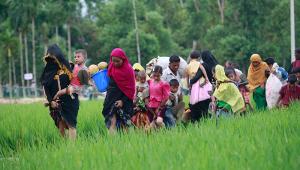As humanitarian crises are worsening, the bloc has allocated an initial annual budget of €1.6bn for 2019. In 2018, the initial budget was €1.07bn, although the final budget for 2018 increased to €1.75bn. The money allocated to humanitarian assistance may change during the course of this year as well.
Christos Stylianides, commissioner for humanitarian aid and crisis management, said the new high budget means the EU remains a “leading humanitarian donor” in crises such as Syria and Yemen.
He said: “Humanitarian aid alone cannot solve all problems, but we must do everything in our power to help the most vulnerable.
“This is our humanitarian duty. We must also think about the impact of these many crises on children, on the next generation.”
He added that 10% of the 2019 budget would be dedicated to education in emergencies.
Most of the money will be allocated to the crisis in Syria, helping refugees in neighbouring countries, and to the conflict in Yemen.
Syria’s ongoing civil war broke out in 2011, and an estimated 400,000 people have been killed.
In Yemen, official figures show that at least 60,000 people have died since the civil war broke out in 2015. The country is also on the brink of famine, according to the UN, as aid agencies struggle to get in to provide food.
EU aid will also support people affected by the Ebola outbreak in African countries, such as South Sudan, the Lake Chad Basin region and the Democratic Republic of the Congo, as well as regions suffering from food shortages, such as Sahel, the statement said.
Funding will also go towards helping communities hit by climate-related disasters to better prepare for shocks, such as droughts, floods and cyclones.
EU humanitarian assistance helps millions of people across the world. It is implemented via humanitarian partner organisations, including UN agencies and non-governmental organisations.







